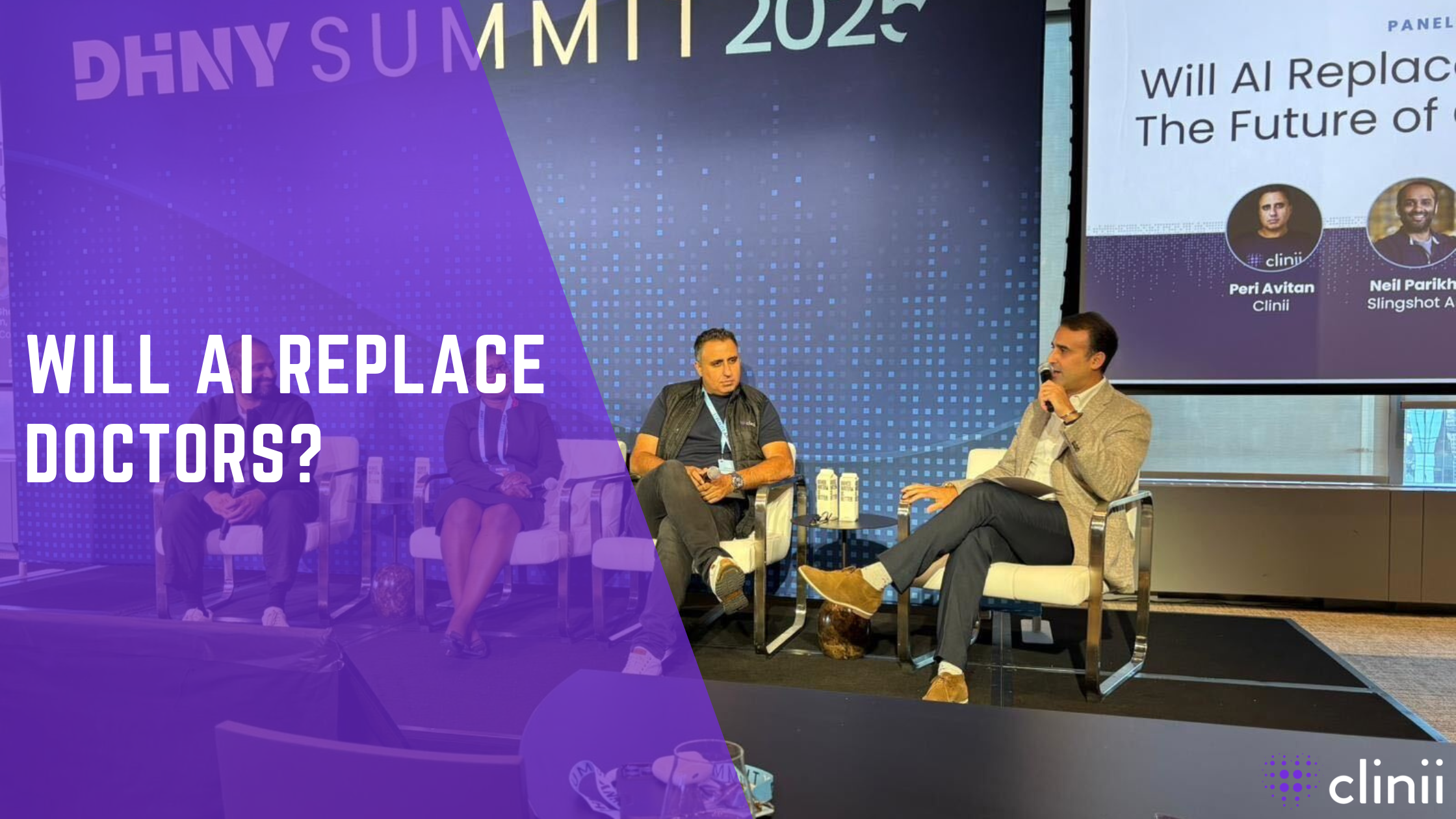
Will AI Replace Doctors? An In-Depth Look at the Evolving Healthcare Landscape
Bring up the topic of artificial intelligence (AI) in virtually any conversation right now and you’re likely to get a mixed bag of very strong opinions—on everything from whether ChatGPT is a suitable therapy replacement to the abundance of bizarre AI-generated images popping up all over the internet right now.
AI’s strongest proponents tout its promise to revolutionize the workforce by maximizing productivity and cutting back on unnecessary costs. But one ubiquitous concern that’s been on many a mind is the threat of AI-induced job displacement—and given some of the bleak unemployment projections out there, the concern isn’t all that far-fetched.
AI technology has already made huge strides in the healthcare field, and it’s only predicted to gain momentum from here. It’s easy to see where all the enthusiasm comes from, but for the many burned-out clinicians who were already skeptical of new technologies to begin with, adding yet another tool into the mix only warrants, at best, an eye roll and, at worst, existential dread around their own job security.
The big question, now, is: Will AI replace doctors? Let’s investigate.
The Biggest Challenges Facing US Healthcare Today
Job displacement is far from the only worry on the mind of the average healthcare professional today. Recently, some of the most influential voices in the digital health space gathered at the fourth annual Digital Health New York (DHNY) Summit to discuss some of the industry’s biggest challenges and, of course, where AI fits into it all.
A Domino Effect
“The [healthcare] model that we have today is just not sustainable, and that’s a fundamental principle that we can’t get away from,” said Launette Woolforde, deputy system chief nursing officer at Northwell Health. Woolforde, who sat on a panel at the DHNY Summit called, Will AI Replace Your Clinician? The Future of Care in Question, expanded on the sustainability issue, arguing that there just isn’t enough manpower to satisfy the ever-growing demands of the struggling American healthcare system.
The shortage of healthcare workers kicked off a domino effect that’s brought on an epidemic of seriously burned-out clinicians whose faith in the healthcare system has steadily declined over time. Mountains of redundant paperwork and administrative tasks that eat up a disproportionate chunk of the average workday are commonly cited by clinicians as major culprits behind the burnout—that’s valuable time that could be spent caring for patients.
In a survey conducted by McKinsey & Company, more than one-third of physician respondents planned to vacate their current role and, of these, 60% indicated a desire to leave the profession altogether.
When more than 130 million Americans depend on a tremendously overworked system to treat at least one chronic condition, it’s not hard to see why patients are also rapidly losing faith in clinicians who can’t even find the time or energy to give them the care they need.
Case in point: In 1966, over 75% of Americans reported having high levels of confidence in healthcare professionals. By 2019, that number had dwindled to just 15%, with many respondents noting that care had become “increasingly impersonal and difficult to access.”
A Brief History of AI in Medicine
The enormous amount of publicity AI has received in recent times can make it feel like we’re headed straight into uncharted territory, but AI in medicine is by no means a new concept. Researchers began experimenting with simple machine learning all the way back in the 1950s, and with the introductions of groundbreaking models like the Causal-Associational Network (CASNET), DXplain, and Watson, AI technology has since demonstrated its ability to diagnose, provide evidence-based solutions, and position itself as a valuable tool for delivering high-quality care.
AI’s Role in Healthcare Today
Today, AI technology can provide real-time insights during treatment, flag trends while analyzing health data, and assist in the creation of personalized care plans. It can also automate administrative tasks, including checking insurance benefits, submitting claims, generating clinical notes, and summarizing health records—all of which grant clinicians more time to spend with their patients.
AI’s impressive diagnostic abilities have proven to match (or, in some cases, exceed) those of a human physician. For instance, a physician combs through a patient’s medical history, notes their current symptoms, and analyzes their lab results to determine a diagnosis and develop a treatment plan accordingly. By comparison, an AI system’s ability to parse through large amounts of data very quickly allows it to complete the same task with equal (or greater) accuracy in just a fraction of the time it takes the physician.
Answering the Big Question: Will AI Replace Doctors?
Few would disagree that AI’s modern capabilities are remarkable, but it still has its share of limitations that keep it from being a viable replacement for a living, breathing human doctor—at least, not in the foreseeable future.
“I think the question we should be asking is, can the clinicians even keep up without the AI at this point?” said Peri Avitan, founder and CEO of Clinii and panelist at DHNY. In reality, the colossal volume of work alone is enough to reassure most clinicians that they need not worry about being replaced by AI.
Work Smarter, Not Harder
Even the most vocal critics will agree that AI isn’t likely to go anywhere anytime soon, and with healthcare workers being crushed under the increasingly unrealistic demands of a broken system, accepting the inevitability of AI may be the only option.
“This is the time for us to embrace AI,” said Woolforde. “We need to work smarter, not harder.” Woolforde stressed that current efforts won’t be enough to meet the needs of an aging population, especially when so many already suffer from at least one chronic condition as is.
The Future of AI in Healthcare
While AI certainly won’t be putting clinicians out of work in the near future, they should, nevertheless, be prepared to adapt to the changing roles and responsibilities that come with integrating AI technology into the workflow.
A leading AI-powered Chronic Care Management platform streamlines care coordination, automates repetitive tasks, and improves operational efficiency so care teams can focus more of their time and energy on delivering high-quality care.
“Patients will have more access to care because of the AI,” said Avitan, who is confident that the technology will have a profound impact on the worker shortage by alleviating much of the workload.
Those in the behavioral health space have also been eager to see what AI will bring. For instance, by proactively flagging patterns in the data of at-risk patients, AI could allow for early detection of various mental health disorders.
“AI could be even more effective than a [conventional] therapist for seeing actual behavioral changes,” said Neil Parikh, DHNY Summit panelist and co-founder of Ash, the first AI built specifically for therapy.
“There are levels of AI therapy,” said Parikh, emphasizing the fact that ChatGPT is not designed for mental health treatment and often validates users, instead of telling them what they need to hear.
Behavioral health care has long been considered inaccessible for many, but with large language models (LLMs) now capable of learning from data at scale and recognizing the unique needs, values, and cultural norms of individuals, care could become more personalized, accessible, and communicative.
What Can’t AI Replace?
While the possibilities of technology truly do feel limitless at times, there are certain things AI will probably never be able to replace in healthcare settings, including one uniquely human trait: Compassion. At the end of the day, AI is most valuable as a tool to enhance—rather than replace—human connection and knowledge. As Avitan summed it up nicely during the DHNY Summit panel, “The empathy of the doctor is irreplaceable.”
This content was created for and owned by Clinii. For all inquiries regarding distribution, please contact marketing@clinii.com.
Ready to Unlock the Benefits of CCM?
Let’s talk about how Clinii can help you launch or optimize your Chronic Care
Management program.


